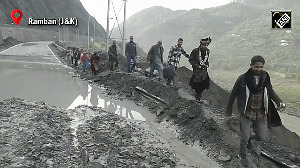Snowfall has begun high up in the Pir Panjal mountains, sending chills down the spines of numerous survivors in the earthquake-ravaged remote border villages here.
For them, this winter will be endless days of misery since this time, they do not have a roof above their heads, what with their houses shattered to smithereens by a furious Mother Nature.
Left to the elements, these usually determined but now browbeaten people pray for a tent that can at least give them some respite from the rains, if not from the hard-hitting snow.
"Inshallah, we have at least got back our life. But what is the purpose of living under the open skies with our houses lying nearby in a big mound of rubble," asks Sadaqat Hussain, a resident of Kundi Barjala village.
Hussain's shattered dwelling is situated more than five kilometres from Kamalkote, from where relief and rescue operations to remote villages are being coordinated. "The tents are there, very much there. But only in accessible areas like Kamalkote. But in our villages and beyond, there are none," he laments.
Hussain, like many others in his village, trudges downhill daily to Kamalkote through a mule-track, hoping he will be lucky in getting a tent. But he has been disappointed for days now.
With the harvest season just over, many villagers have some stock of grain with them but they say there is an acute shortage of cooking oil and pulses. Though 'langars' organised by army and paramilitary forces provide much relief to many hungry mouths, residents of remote villages have to trek kilometres together to relief centres to get their share.
"My family comprises of fifteen members. While women and kids sit out in the open beside their ravaged houses, we men go to relief camps seeking tents and food," says Mohammad Shafi, of the same village.
Some survivors complain that tents, which have arrived at the relief centres, are grabbed by influential people like village heads who then distribute it among their near and dear. "I have no one to recommend for me. Is this the reason why I have been coming here for the past seven days but going back empty-handed," asks Shafi.
Divisional commissioner, Kashmir, B B Vyas, who is coordinating relief and rescue operations in the Valley, admits that there is an acute shortage of tents but insists it will be overcome within a week.
"We have speeded up the procurement of tents and would set them up in affected areas within a week," he said.
However, a senior official of the state administration who did not want to be named, said that though tents could provide some respite from rains, they would prove useless once the snowfall began.
"Last year, the winter set in quite early and lasted for a record time. This year also, we expect an early onset of winter," he said. "The real focus of rehabilitation should be to repair the damaged houses as soon as possible. Tents should be seen only as a very short-term alternative."
Survivors have seen a ray of hope, with the administration disbursing Rs 40,000 as the first installment for each family for material losses suffered and repair of houses. But the big question troubling relief workers is how to renovate these houses on a war footing with a limited number of skilled labourers.
Though army and CRPF personnel have repaired a few houses in the area with help from volunteers, a mammoth effort will be needed to ensure that every head has a roof above, before the bone-chilling winter sets in.







 © 2025
© 2025